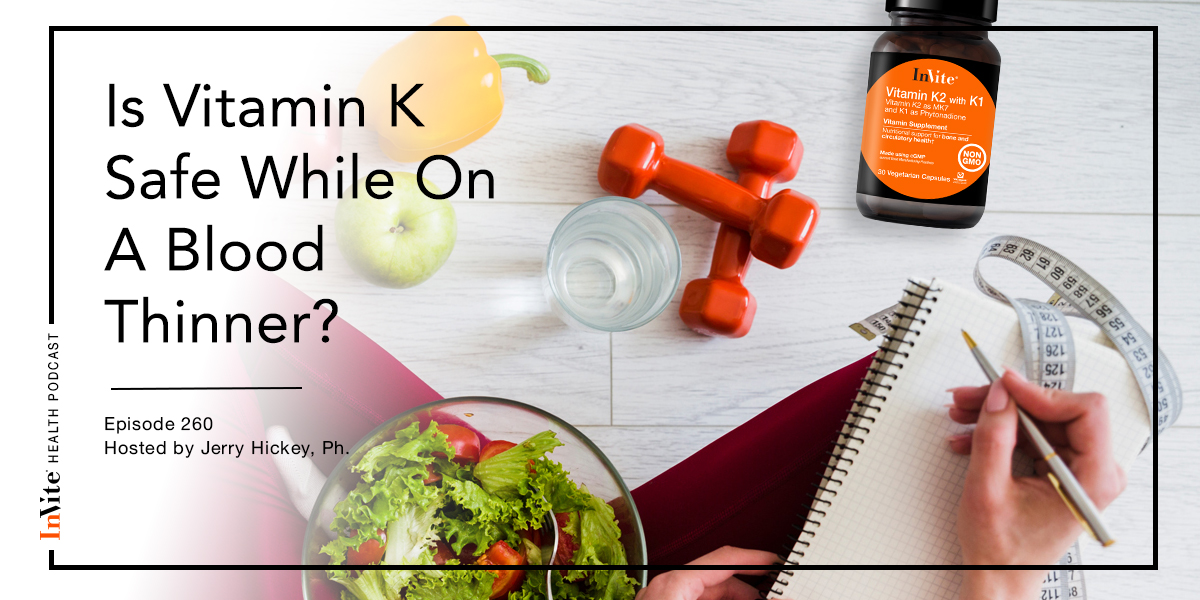Is Vitamin K Safe While On A Blood Thinner? – InVite Health Podcast, Episode 260

vitamin k
Invite Health Podcast, Episode hosted by Jerry Hickey. Ph
Subscribe Today!
Is it safe to eat Vitamin K-rich foods while you’re on a blood thinner? Can you take your multivitamin if it has Vitamin K in it while you’re on a blood thinner? The answer is absolutely yes. Eat those vegetables, eat that fruit, take that multivitamin and get healthy. But there is one exception, and that’s Warfarin, also known as Coumadin.
An Overview
Vitamin K is a fatty-soluble vitamin. You have to take it with food for it to be absorbed. Evidence shows that many Americans are low in this vitamin because of our lifestyle and eating habits. You need two forms of this nutrient – K1 and K2.†
Vitamin K is needed for strong bones. It helps create the receptor sites for calcium on the organic matrix on the foundation of the bone that’s made out of collagen and you need Vitamin K to take the calcium out of your blood and shove it into the bone. It does this by activating a proteinaceous enzyme called osteocalcin. We call that carboxylation. The osteocalcin grabs the calcium and brings it into the bone. There’s a second enzyme that’s important called matrix Gla-protein that is also Vitamin K-dependent. That’s the thing that grabs the calcium in the bloodstream and brings it over to the bone, so you have a handoff there. You have matrix Gla-protein picking up the calcium out of the bloodstream and bringing it over to the bone, where it hands it off to osteocalcin to firmly shove it into the bone.†
Why Strontium Is An Important Mineral For Bone Health – InVite Health Podcast, Episode 257. Listen Now >>
Learn more about the bone building process and the importance of Vitamin K by tuning into the full podcast episode.
What about blood clotting?
Vitamin K is a gatekeeper for blood clotting. It helps prevent you from bleeding to death if you have a wound or cut or are getting surgery, but at the same time, it can help prevent a blood clot that can lead to a stroke or a heart attack. Vitamin K smacks into the blood thinner Coumadin, so everyone thinks that it is a blood thickener. It’s not. It’s a regulator. Vitamin K prevents bleeding after a cut, so it is essential for water-soluble clotting factors to activate blood clotting, like blood clotting factors 2, 7, 9 and 10, as well as Protein Z. Protein Z is a member of the coagulation cascade. Coagulation means creating a clot. These are a group of blood proteins that lead to the formation of blood clots. Protein Z is Vitamin K-dependent.†
How To Be Proactive About Bone Health – InVite Health Podcast, Episode 232. Listen Now >>
So what about preventing blood clots with Vitamin K? This vitamin is an essential factor to activate Protein S and Protein C. People who lack Protein S and Protein C are likely to develop blood clots. Protein S and Protein C work together to help prevent improper clotting such as in a pulmonary embolism, deep vein thrombosis, stroke or heart attack. Protein C is a major anticoagulant. It’s naturally circulating in the human body and is Vitamin K-dependent. You need Vitamin K to keep Protein C active because you don’t want a stroke or heart attack. This activated form, along with the Protein S degrades clotting factors. You need enough of it and it has to work well to protect you from blood clots. If you lack either Protein C or Protein S genetically or because you lack Vitamin K, it can lead to thrombophilia, which is a tendency to develop blood clots.†
Tune into the full podcast episode to learn more about the functions of Protein C and Protein S.
Types of Vitamin K
There are three types of Vitamin K. There’s the synthetic one that they sell as a prescription. That doesn’t seem to work so well for certain activities such as building bone. Then, there’s Vitamin K1 and Vitamin K2.†
Vitamin K1 is called phylloquinone or phytonadione. It’s found in green leafy vegetables like broccoli, kale, brussels sprouts, spinach and lettuce, but also in asparagus, green beans and some vegetable oils. Most of this vitamin in our American diet is K1. Vitamin K2 is more in fermented foods. You can get it in meats, like a steak or a chicken leg. It is called menaquinone and there’s a whole bunch of different varieties of it. It’s found in fermented dairy products like yogurt, kefir and cheeses, as well as fermented soy foods like tempeh and miso.†
The absorption rate of K1 from a supplement is approximately 80%. The absorption from food is significantly lower. Even if a food has a lot of K1, you don’t absorb it that well. Vitamin K2 is better absorbed from foods.†
Listen to the full podcast episode for more details on how to take Vitamin K and why it’s important for the body.
Thank you for tuning in to the Invite Health Podcast. You can find all of our episodes for free wherever you listen to podcasts or by visiting www.invitehealth.com/podcast. Make sure you subscribe and leave us a review! Follow us on Facebook, Twitter and Instagram at Invite Health today. We’ll see you next time on another episode of the Invite Health Podcast.



You are AMAZING! I am a nurse practitioner, and I have learned so much from listening to your podcasts. I really appreciate how you explain the rationale for supplementation based on physiology, biochemistry and molecular mechanisms of action of supplements. Very, very infomative. Thank you!!
Thank you for your comment and for listening, Amy! We hope to continue bringing you insightful and educational content.